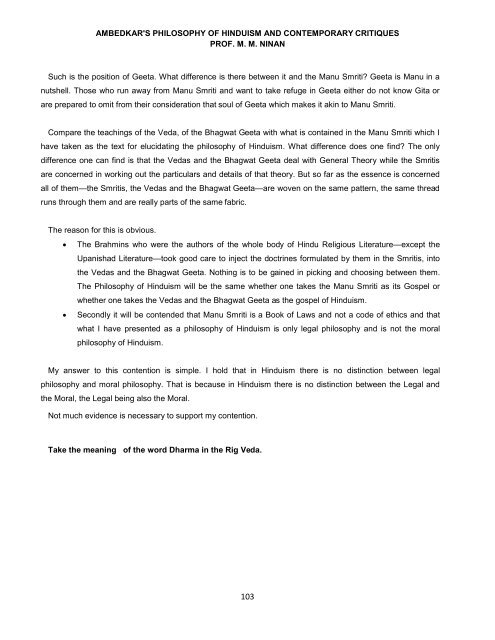Ambedkar-Philosophy of Hinduism
You also want an ePaper? Increase the reach of your titles
YUMPU automatically turns print PDFs into web optimized ePapers that Google loves.
AMBEDKAR'S PHILOSOPHY OF HINDUISM AND CONTEMPORARY CRITIQUES<br />
PROF. M. M. NINAN<br />
Such is the position <strong>of</strong> Geeta. What difference is there between it and the Manu Smriti? Geeta is Manu in a<br />
nutshell. Those who run away from Manu Smriti and want to take refuge in Geeta either do not know Gita or<br />
are prepared to omit from their consideration that soul <strong>of</strong> Geeta which makes it akin to Manu Smriti.<br />
Compare the teachings <strong>of</strong> the Veda, <strong>of</strong> the Bhagwat Geeta with what is contained in the Manu Smriti which I<br />
have taken as the text for elucidating the philosophy <strong>of</strong> <strong>Hinduism</strong>. What difference does one find? The only<br />
difference one can find is that the Vedas and the Bhagwat Geeta deal with General Theory while the Smritis<br />
are concerned in working out the particulars and details <strong>of</strong> that theory. But so far as the essence is concerned<br />
all <strong>of</strong> them—the Smritis, the Vedas and the Bhagwat Geeta—are woven on the same pattern, the same thread<br />
runs through them and are really parts <strong>of</strong> the same fabric.<br />
The reason for this is obvious.<br />
• The Brahmins who were the authors <strong>of</strong> the whole body <strong>of</strong> Hindu Religious Literature—except the<br />
Upanishad Literature—took good care to inject the doctrines formulated by them in the Smritis, into<br />
the Vedas and the Bhagwat Geeta. Nothing is to be gained in picking and choosing between them.<br />
The <strong>Philosophy</strong> <strong>of</strong> <strong>Hinduism</strong> will be the same whether one takes the Manu Smriti as its Gospel or<br />
whether one takes the Vedas and the Bhagwat Geeta as the gospel <strong>of</strong> <strong>Hinduism</strong>.<br />
• Secondly it will be contended that Manu Smriti is a Book <strong>of</strong> Laws and not a code <strong>of</strong> ethics and that<br />
what I have presented as a philosophy <strong>of</strong> <strong>Hinduism</strong> is only legal philosophy and is not the moral<br />
philosophy <strong>of</strong> <strong>Hinduism</strong>.<br />
My answer to this contention is simple. I hold that in <strong>Hinduism</strong> there is no distinction between legal<br />
philosophy and moral philosophy. That is because in <strong>Hinduism</strong> there is no distinction between the Legal and<br />
the Moral, the Legal being also the Moral.<br />
Not much evidence is necessary to support my contention.<br />
Take the meaning <strong>of</strong> the word Dharma in the Rig Veda.<br />
103


















